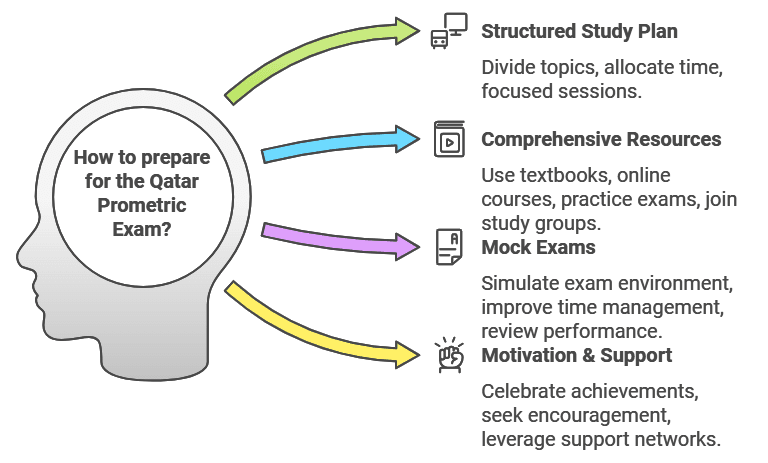Understanding the Qatar Prometric Exam for Pharmacists
The Qatar Prometric Exam is designed to test a pharmacist's knowledge and competency in the field of pharmacy. The exam aims to ensure that all practising pharmacists meet the necessary standards of care and professional practice expected in the country. Passing this exam is crucial for foreign trained pharmacists wishing to secure a license to practice in Qatar.
Exam Format of the Qatar Prometric Exam
The Qatar Prometric Exam for pharmacists consists predominantly of multiple-choice questions ions (MCQs). You can check for updates on the official MOHP website. Heres is an overview of the exam format:
- Number of Questions: The exam typically comprises around 150 MCQs, testing a wide range of topics relevant to pharmacy practice.
- Duration: 180 minutes
- Passing Score: A minimum score of 60% is required to pass.
- Attempts: Candidates are generally allowed a maximum of three attempts to pass the exam. This policy emphasises the importance of thorough preparation before taking the exam.

High-Yield Areas for Preparation
To excel in the Qatar Prometric Exam, it is crucial to concentrate on high-yield areas that are fundamental to pharmacy practice. The following subjects are essential for your study plan:
- Clinical Pharmacology: This area focuses on the safe and effective use of medications in patient care. Candidates should understand drug mechanisms, indications, contraindications, and potential side effects.
- Pharmacognosy: This branch examines natural products used as medicinal drugs. Familiarity with herbal medicines and their applications is increasingly relevant in modern pharmacy.
- Pharmacy Law and Regulations: Knowledge of local and international pharmacy laws is essential for ensuring compliance in practice. One must also understand medication distribution, prescription management, and ethical considerations in pharmacy.
- Drug Safety and Patient Counseling: Emphasis on patient education regarding medication use is vital. Pharmacists must effectively communicate the importance of adherence, potential side effects, and lifestyle modifications to enhance patient outcomes.
- Dosage Forms and Compounding: Understanding different medication forms and compounding practices is critical for meeting patient-specific needs. This includes knowledge of sterile and non-sterile compounding, as well as appropriate dosage calculations.
By mastering these subjects, candidates will be well-equipped to tackle the exam and succeed in their pharmacy careers in Qatar.
Strategies for Effective Exam Preparation
An effective preparation is a key to acing the prometric exam. Adapting effective strategies and having a planned approach ensures success. Here are some tips to help you with preparation!
Develop a Structured Study Plan: Start by dividing the topics into manageable sections, allocating specific time slots for each. Aim for focused study sessions of 1 to 2 hours to maintain engagement and avoid fatigue.
Utilise Comprehensive Study Resources: Utilise a variety of study materials, including textbooks, online courses, and practice exams tailored specifically to the Qatar Prometric Exam format. These resources will enhance your understanding and retention of information. Additionally, consider joining study groups or forums to share knowledge and gain insights from peers who are also preparing for the exam.

Practice with Mock Exams: Taking mock exams is one of the most effective ways to prepare. Simulating the actual testing environment will help you become familiar with the exam format and improve your time management skills. After each mock exam, review your performance to identify strengths and weaknesses, allowing you to adjust your study plan accordingly.
Stay Motivated and Seek Support: Maintaining motivation throughout your preparation can be challenging. Celebrate small achievements, such as completing a difficult topic or performing well on a practice test. Surround yourself with supportive peers or mentors who can offer encouragement and share resources. Remember, you’re not alone in this journey, and leveraging support networks can make a significant difference.
Consider Professional Support: Organisations like Academically Global provide mentorship, study materials, and live sessions designed to anchor your preparation and enhance your confidence. Engaging with professionals who understand the exam requirements can offer valuable insights and strategies for success.
Create Summary Notes: As you study, create concise summary notes for each topic. This will help reinforce your understanding and serve as a quick reference for revision closer to the exam date.
Use Flashcards: Flashcards are an excellent tool for memorising key terms, drug classifications, and important pharmacological concepts. They facilitate active recall, which is essential for retention.
Final Thoughts
Becoming a licensed pharmacist in Qatar is achievable when one is committed, careful, and deliberate about preparation. To ensure guaranteed success, one must have clear knowledge of the format of the Qatar Prometric Exam, focus on high-yield areas, and employ effective study strategies. The rewards of a pharmacy career in Qatar, including competitive salaries, career growth, and a high quality of life, make the effort worthwhile.
The objective of Academically Global is to provide you with whatever support you need for an outstanding pharmacy career. In all matters, from the exam preparation to seeking employment, we will accompany you step by step on this journey. Are you ready to start your Qatar journey? Schedule your free consultation for a head start on your dream pharmacy career.